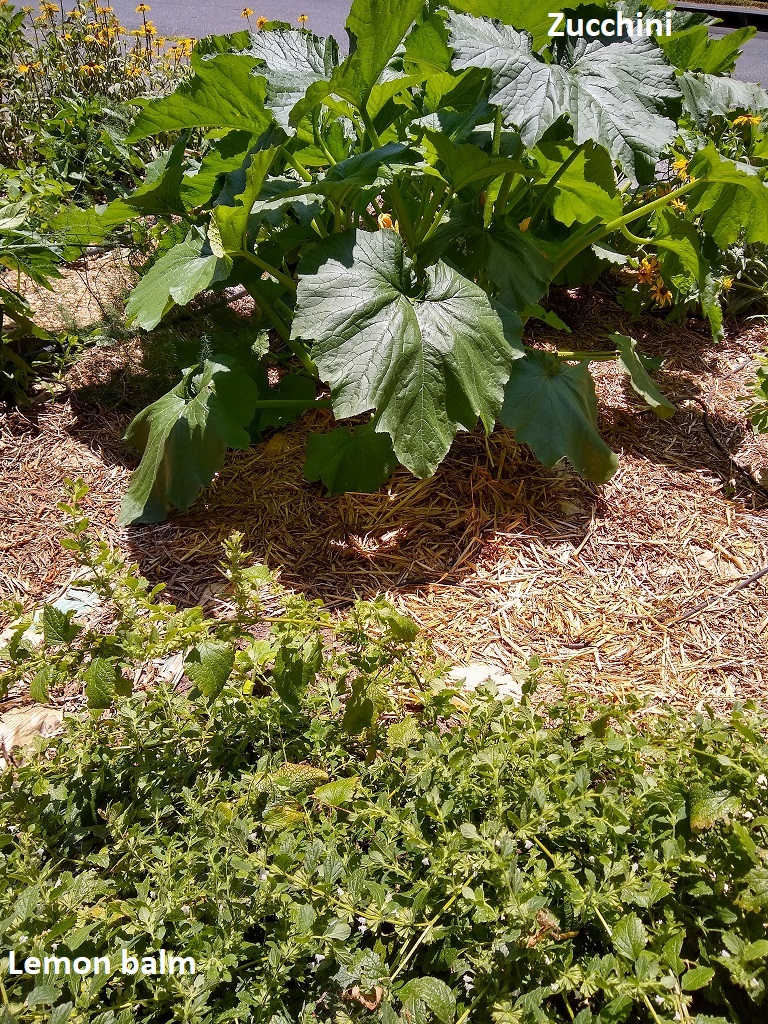
Lemon balm: Ancient herb, still in season
Lemon balm (Melissa officinalis) is growing rampant in my (vegetable) garden right now (see left), and some recent personal experiences have inspired me to write about the history of herbal medicine. I thought I’d combine the two ideas and share some common current uses of lemon balm that were handed down through centuries of use.
Clinically, I was taught to use lemon balm primarily as a nervine – a fancy word for “calms the nerves”. A relative of peppermint and catnip, its lemony zing makes for a tasty tea that can be drunk to take the edge off anxiety or what I refer to as ‘the jitters’.
Though not particularly sedating, lemon balm would be a nice choice to use (perhaps along with peppermint, chamomile, or lavender) before bed after a stressful day. It is also indicated when anxiety is accompanied by a racing heart or dyspepsia.
Steep 6-12g of dried herb in 2-3 cups of boiling water for 15 minutes.
For other contemporary uses of this easy-to-grow herb garden staple, see the 2017 ATH post on Calm and Cool Herbs. As an herbalist, what I find fascinating (and validating) is that herbs we continue to use today were documented hundreds of years ago. (For additional musings on the history of herbal medicine, see my latest blog post on www.greenhavenliving.com.)
For lemon balm, specifically, one of the earliest references I found was written by the Greek doctor Dioscorides back in the first century AD. In his ‘de materica medica’ he writes that lemon balm is:
“good for those touched by scorpions…It is suitable for women’s hip baths for moving the menstrual flow, as a mouth rinse for toothache, and as an enema or suppository for dysentery.”
Not quite the modern usage of today (though good to know should I ever be bitten by a scorpion!). Fast forward to the 1600’s, where English botanist/herbalist Nicholas Culpeper colorfully describes lemon balm:
“…it causes the mind and heart to become merry, and revives the heart, faintings and swoonings, especially of such who are overtaken in sleep, and drives away all the troublesome cares and thoughts out of the mind, arising from melancholy or black choler…It is very good to help digestion, and open obstructions of the brain, and hath so much purging quality in it as to expel those melancholy vapours from the spirits and blood which are in the heart and arteries…” (Culpeper, 1653)
Doesn’t this sound like the “nervine” I mentioned? Writers were much more descriptive years ago, but ‘’driving away troublesome cares” and “expelling melancholy vapours” sure sound like “calming the nerves” to me!
Across the pond and several centuries later, Felter and Lloyd (1898) write that lemon balm is “moderately stimulant…and antispasmodic”, and is “occasionally used to assist menstruation.” “Stimulant” may refer back to what Culpeper more colorfully described as “becoming merry”, “antispasmodic” is a characteristic of a nervine, and didn’t Dioscorides mention menstruation 1800 years prior? At this point can you see a pattern emerging?
Today, referencing one of my go-to modern herb books, Braun & Cohen (2015) includes a lengthy discussion of lemon balm as having anxiolytic, sedative, anti-depressant, antispasmodic – among many other – properties. This book is informed and extensively referenced by current research.
As with lemon balm, many (but not all!) traditional uses for herbs have a place in modern herbal medicine. We, as trained herbalists, use the history of herbs as inspiration and the modern science to validate their use. Isn’t that the best of both worlds?
Braun, L. & Cohen, M. (2015). Herbs and Natural Supplements, an Evidence-Based Guide. 4th Ed. Philadelphia, PA, Elsevier.
Culpeper, N. (1653). Culpeper’s Complete Herbal.
Dioscorides (1st cent A.D). de materia medica.
Felter, H. & Lloyd, J. (1898). King’s American Dispensatory.

BIO:
Donna Koczaja, M.S., RH(AHG) graduated from Maryland University of Integrative Health (formerly Tai Sophia Institute) with a Master of Science in Therapeutic Herbalism and a Post-Master’s Certificate in Clinical Herbalism. She earned Registered Herbalist status from the American Herbalists’ Guild in 2018. Originally educated as a mechanical engineer, she combines the rigor of her original scientific training with the traditional healing art of herbal medicine to partner with her clients to uncover the root cause of their underlying health issues. Also a Master Gardener since 2008, her primary interest is in inspiring others to improve their health and sense of wellbeing through the joys of gardening and the power of natural medicine.
Donna currently practices as the professional herbalist at the MUIH Natural Care Center (410-888-9048×6614) in Laurel, Maryland. Read more about her, what she does, and why she does it at www.greenhavenliving.com, or contact her directly at greenhavenliving@gmail.com or 240-353-8754.

